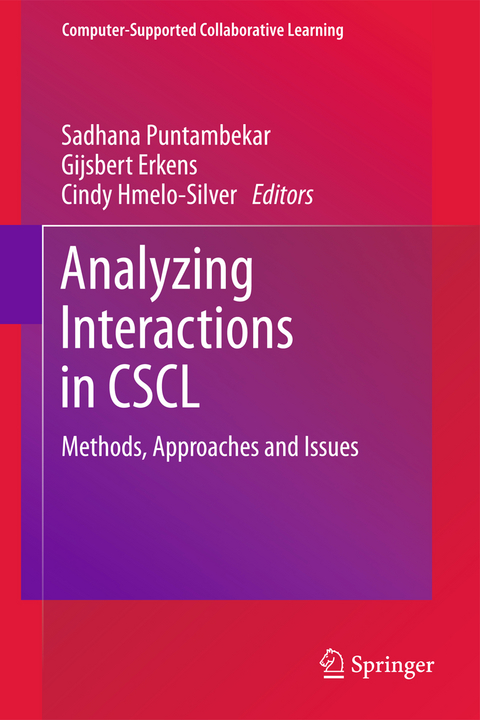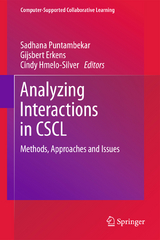Analyzing Interactions in CSCL
Springer-Verlag New York Inc.
978-1-4419-7709-0 (ISBN)
CSCL research tends to span across several disciplines such as education, psychology, computer science and artificial intelligence. As a result, the methods for data collection and analysis are interdisciplinary, from fields such as sociology, anthropology, psychology, computer science, and artificial intelligence. This book brings perspectives together, and provides researchers with an array of methodologies to document and analyze collaborative interactions.
Introduction: Documenting and Analyzing CSCL Interactions.- Part 1: Understanding Group Processes.- A Complexity-Grounded Model for the Emergence of Convergence in Group Discussions.- Analyzing Collaborative Interactions with Data Mining Methods for the Benefit of Research and Learning.- Contextual Perspective in Analyzing Students’ Collaborative Activity in CSCL Contexts.- A Collaborative Analysis and Visualization Platform for Theory Building and Pedagogical Support in Knowledge Building.- Representational Tools for Understanding Complex Computer-Supported Collaborative Learning Environments.- How to Study Group Cognition.- Commentary: Issues in Analyzing and Documenting Group Processes.-Part 2: Individual Learning within Groups.- Analyzing the L in CSCL.- Analyzing Collaborative Learning Through Hierarchical Linear Modeling.- Quantifying Qualities: Multi-Dimensional Analyses of Text-Based Communication in CSCL.- Using Multilevel Analysis in CSCL Research.- Assessing Argumentation in CSCL: Goals, Structures and Functions.- Commentary: Role of Individual Learning and Group Processes in CSCL.- Part 3: Frameworks for Analyzing CSCL.- An Interaction-Aware Design Process for the Integration of Interaction Analysis in Mainstream CSCL Practices.- Towards an Automatic Measure of Transactivity in On-line Discussions.- Analyzing Collaborative Interactions in Multiple Science Learning Contexts.-An Analytic Framework for Conceptualizing and Representing Distributed Mediated Interaction.- Analyzing Collaborative Interactions Across Domains and Settings: An Adaptable Rating Scheme.- Commentary: Analyzing Group Interactions Design of CSCL Systems.-Concluding Commentary: Issues and Dilemmas in Analyzing Learning and Collaboration.
| Erscheint lt. Verlag | 22.12.2010 |
|---|---|
| Reihe/Serie | Computer-Supported Collaborative Learning Series ; 12 |
| Zusatzinfo | XXII, 416 p. |
| Verlagsort | New York, NY |
| Sprache | englisch |
| Maße | 155 x 235 mm |
| Themenwelt | Schulbuch / Wörterbuch ► Unterrichtsvorbereitung ► Unterrichts-Handreichungen |
| Informatik ► Theorie / Studium ► Künstliche Intelligenz / Robotik | |
| Sozialwissenschaften ► Pädagogik ► Schulpädagogik / Grundschule | |
| ISBN-10 | 1-4419-7709-0 / 1441977090 |
| ISBN-13 | 978-1-4419-7709-0 / 9781441977090 |
| Zustand | Neuware |
| Haben Sie eine Frage zum Produkt? |
aus dem Bereich




